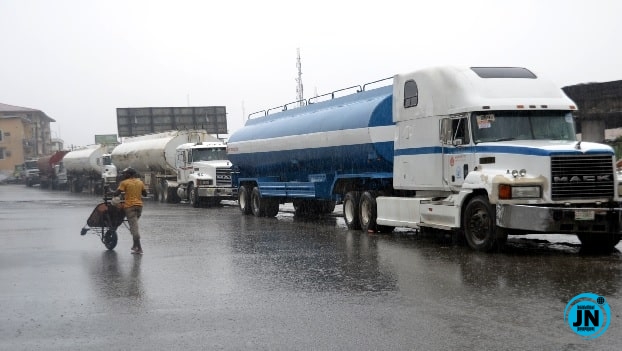The members of NARTO, the Nigerian Association of Road Transport Owners, have opted to terminate their strike following the Federal Government's commitment to settle outstanding bridging claims associated with transporting petrol nationwide.

The strike, initiated on Monday by tanker owners, was driven by discontent over high operational costs and the government's failure to implement a new freight rate for petrol transportation.
After an extensive meeting with NARTO, oil marketers, and the Nigerian Midstream and Downstream Petroleum Regulatory Authority (NMDPRA), Senator Heineken Lokpobiri, the Minister of State Petroleum Resources (Oil), announced that the government would verify and settle all outstanding bridging claims.
Lokpobiri highlighted that while most of the transporters' concerns were commercial, the Federal Government intervened to find solutions and ensure the resumption of product transportation.
He stated, "I want to announce to Nigerians that after consultations with all stakeholders, we have come to a conclusion that the strike will be called off. All the issues they raised have been addressed, and I have also given commitments on behalf of the government that going forward, the government will do what is expected."
"We have given our commitment and have started paying some of the bridging claims. We have also committed that in the next four weeks, maximum by the middle of next month, we would have done with the reconciliation so that those that are owing will pay up," he added.
Oil marketers and NNPC Limited will continue engaging with stakeholders to ensure petrol supply across the country, Lokpobiri mentioned.
Confirming the agreement, NARTO National President, Alhaji Yusuf Lawal Othman, stated that the deal includes an improvement in the freight rate from the current N32 per litre. He assured that the current pump price of petrol would adequately accommodate the new rate.
"This has no relation with the pump price. Our agitation is as regards the freight rate for the transportation of petrol. In any case, you have to transport the fuel before you sell it, and if the amount they are paying is not adequate to move the product to the stations, you will not see it to buy," Othman explained.
"There has been some movement even though it is not what we expected, but at least we have made some progress. Going forward, we will continue to negotiate with the marketing companies based on economic realities," he assured.
Engr. Farouk Ahmed, the Chief Executive of NMDPRA, elaborated that the last freight rate review was in March 2022 during the petrol subsidy regime. He highlighted the shift in diesel costs from N700 to N1,400 and emphasized that with the full deregulation of the downstream sector, the government no longer determines freight rates.
"NARTO members were requesting an increase, but as a regulator, NMDPRA, we said we were not going to enforce any price increase because the market is deregulated. Therefore, we asked them to meet with the marketers they service to negotiate on a one-on-one basis. The marketers were reluctant to increase the rate, leading to the strike action," Ahmed added.
"We thank God that after negotiations yesterday and today (Monday and Tuesday), they arrived at a conclusion. Some of them have agreed on rates like the NNPC, Total, but there are a few others left, and negotiations are continuing," he concluded.